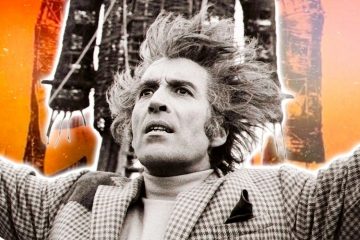There was one story Star Trek franchise creator Gene Roddenberry always intended to tell – but he never quite got the chance. Roddenberry wanted the crew of the USS Enterprise to meet — and in some cases kill — God. It’s a theme that recurs often in the various iterations of the franchise. Yet when Star Trek finally came face to face with the Almighty, Roddenberry hated the plot.Surprisingly little of Star Trek was written by Roddenberry himself. He dreamed up the characters, the ships and maintained control on every aspect of the production — yet the actual scripts usually fell to writers and producers on the staff. One idea he gave them repeatedly involved the characters meeting an alien who turned out to be what early humans mistook for God. Roddenberry was a devout atheist; in his view, religion’s propensity to do harm outweighed the good it provided. He imagined that as humanity advanced, people would outgrow the need for a deity. The story he wanted to tell was always distilled down until Star Trek V: The Final Frontier — and Roddenberry hated the film because of the way the Enterprise crew fell for Sybok.Star Trek: The Original Series tackled the concept of god and faith more than once during its three-year run. Captain James T. Kirk often acknowledged God, even in the episodes where other such deities are met. Two stories were similar to the one Roddenberry wanted to tell, but not exact. “Who Mourns for Adonais?” (written by Gilbert Ralston and Gene L. Coon) introduced the Enterprise crew to Apollo, the last of the gods. Kirk sent him packing by rejecting him. In the Emmy-winning The Animated Series episode “How Sharper Than a Serpent’s Tooth” (written by Russell Bates), the crew met K’ulK’ulkan, who was depowered and left to live as a mortal. That series also featured an episode called “The Magicks of Megas-Tu,” which featured a character named Lucien — presented as the inspiration for, or even embodiment of, Lucifer.RELATED: Chris Pine Thinks the Star Trek Film Franchise Is ‘Cursed’
There was one story Star Trek franchise creator Gene Roddenberry always intended to tell – but he never quite got the chance. Roddenberry wanted the crew of the USS Enterprise to meet — and in some cases kill — God. It’s a theme that recurs often in the various iterations of the franchise. Yet when Star Trek finally came face to face with the Almighty, Roddenberry hated the plot.
Surprisingly little of Star Trek was written by Roddenberry himself. He dreamed up the characters, the ships and maintained control on every aspect of the production — yet the actual scripts usually fell to writers and producers on the staff. One idea he gave them repeatedly involved the characters meeting an alien who turned out to be what early humans mistook for God. Roddenberry was a devout atheist; in his view, religion’s propensity to do harm outweighed the good it provided. He imagined that as humanity advanced, people would outgrow the need for a deity. The story he wanted to tell was always distilled down until Star Trek V: The Final Frontier — and Roddenberry hated the film because of the way the Enterprise crew fell for Sybok.
Star Trek: The Original Series tackled the concept of god and faith more than once during its three-year run. Captain James T. Kirk often acknowledged God, even in the episodes where other such deities are met. Two stories were similar to the one Roddenberry wanted to tell, but not exact. “Who Mourns for Adonais?” (written by Gilbert Ralston and Gene L. Coon) introduced the Enterprise crew to Apollo, the last of the gods. Kirk sent him packing by rejecting him. In the Emmy-winning The Animated Series episode “How Sharper Than a Serpent’s Tooth” (written by Russell Bates), the crew met K’ulK’ulkan, who was depowered and left to live as a mortal. That series also featured an episode called “The Magicks of Megas-Tu,” which featured a character named Lucien — presented as the inspiration for, or even embodiment of, Lucifer.
#Gene #Roddenberry #Wanted #Star #Trek #Crew #Meet #God
Note:- (Not all news on the site expresses the point of view of the site, but we transmit this news automatically and translate it through programmatic technology on the site and not from a human editor. The content is auto-generated from a syndicated feed.))



